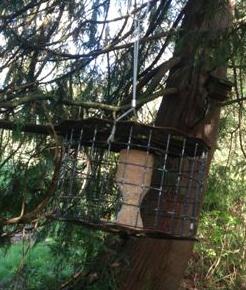Rat Solutions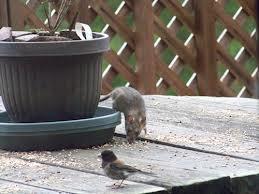
Rats are everywhere people are. And they are probably the number one reason why most people stop feeding the birds. Squirrels people can handle (and sometimes even like) but not rats. But don't despair. Like squirrels, rats can also be deterred from your bird feeders by following similar stratagems. Just remember that feeding birds did not bring rats into your yard; they were in the neighbourhood already, probably enjoying the goodies found in a compost bin, garbage cans, etc.
7 Ways to Keep Rats out of Your Yard
These steps will help you if you either have rats living in your yard or you want to ensure that that doesn't happen.
- Birdfeeders are rarely to blame for attracting rats into an area. Rats are more likely to be attracted by the odors and smells from pet waste, outdoor pet food bowls, inadequate garbage containers, compost bins, barbecue grills, vegetable garden waste or unharvested fruits and nuts from trees.
- To eliminate rats, you must deny them access to shelter. It is very important to remove potential hiding and nesting sites from around your home, such as firewood stacks, brush and debris piles, dense shrubbery, ground covers and ivy. Repair and/or seal all openings in buildings with durable materials, such as concrete, metal flashing, steel wool or heavy welded wire
- Good sanitation practices will effectively control the ability of rats to survive in and around your yard. Eliminating access to garbage, pet waste, spilled bird seed, open compost bins and unharvested fruits and vegetables is a basic factor in rodent control
- Rats are especially attracted by the odor from barbecue grills and they will utilize the residue meat scraps and fats found on grills as a source of food. If possible, grills should be stored in a secure out-building and should be clean of all grease and food debris when not in use
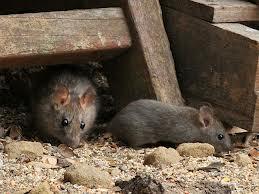
- Do not feeding improper or cheap seed blends. Most discount store blends contain large amounts of cereal grain fillers that the birds leave behind and which can be attractive to rats.
- Do not overfeed your birds. Overfeeding results in too much wasted seed on the ground that will only invite rodents.
- Watch how you store your birdseed. Storing birdseed in improper containers or in areas accessible to rodents can lead to rodent problems
Feeding your birds not the rats
Feeding birds in a responsible manner will help you to keep rats from destroying the enjoyment you get from your hobby.
-
The number one recommendation is to feed cleanly. No debris left on the ground for rodents to eat will give them no excuse to come into your yard.
-
No ground feeding. Food scattered directly on the ground can be attractive to rodents
-
Select the proper food. Consider feeding only a single type of seed in a feeder to reduce the amount of scattered seed that reaches the ground.
Sunflower chips work very well for this purpose when tidy feeding is the priority. Good quality suet or shelled peanuts hung from a properly placed and baffled pole will also work well. If the feeders are not hung on a baffled pole, take them indoors each evening. Feed black oil sunflower seeds or blends that are high in black oil sunflower seeds or chips if your feeders are hung on a baffled pole and place a good quality tray below them.
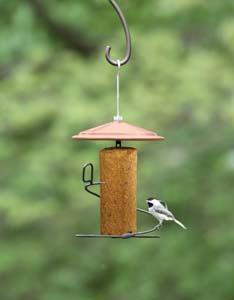
-
Feed Hot Pepper Bird Food. We now carry Hot Pepper Suet Doughs in cakes and cylinders as well as Hot Pepper Seed Cylinders. Birds and mammals have different taste receptors so what is very hot and uncomfortable to eat for mammals won't bother birds when they eat it. It is not 100% effective, it appears that 90% of the squirrels and rodents that eat the Hot Pepper Foods do not like it.
-
Don’t overfeed. Put out only as much food as your birds will eat in a day or two, especially millet. Over feeding will result in seed available for rodents to eat whether it be on the ground or in your feeder.
-
Use the proper feeders and trays. It is important to select the feeders that are appropriate for the types of birds you want to attract. Proper trays and screens placed below the feeder will eliminate ground spillage and give the ground feeding birds a vermin-proof place to eat.
-
Feeder and tray combinations to consider would include
: APS set-up with squirrel baffle to hold feeders
: Finch or seed tube feeders with trays
: Peanut feeders with trays
: Dinner Bell Feeders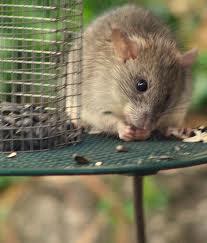
- Use baffles to eliminate easy access. Hang a round baffle above any feeder to protect against roof rats and squirrels. Using long, tube baffles placed five feet high on poles and posts will keep rats and squirrels from climbing up and sitting in the feeder.
- Store seed properly. Keeping seed in a metal, rodent-proof container is the best solution. If you cannot find a metal container (heavy, plastic rubbermaid totes are not suitable as they can be chewed through easily) store the seed in an area that rodents cannot reach.
- Keep feeding areas tidy. Sweep, rake or clean up spilled seed and seed husks on a regular basis, at least once a week. If possible, place your feeders over a hard surface so your clean-up is faster and easier.
Here are some examples of rat proof feeding systems.
This caged cylinder feeder works well for rats and squirrels and is a
favourite with our chickadees & juncos, as you can see.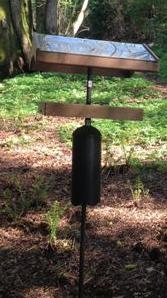
This system on a pole with a baffle is very clean. The baffle keeps anyone from climbing up and the extra large tray gives plenty of feeding space for all birds.
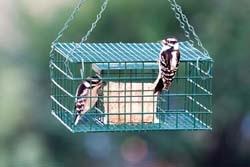
This feeder has a removable plate underneath the suet cakes that prevents anyone from hanging upside down to feed
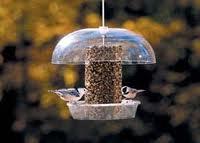
One of the cleanest feeders you can find. The tray keeps all dropped seed off the ground and the cover keeps off the rain
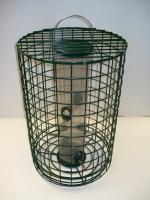 This cage will keep rats and squirrels out of tube feeders. We recommend that you use the metal tray to keep spillage to a minimum.
This cage will keep rats and squirrels out of tube feeders. We recommend that you use the metal tray to keep spillage to a minimum.


